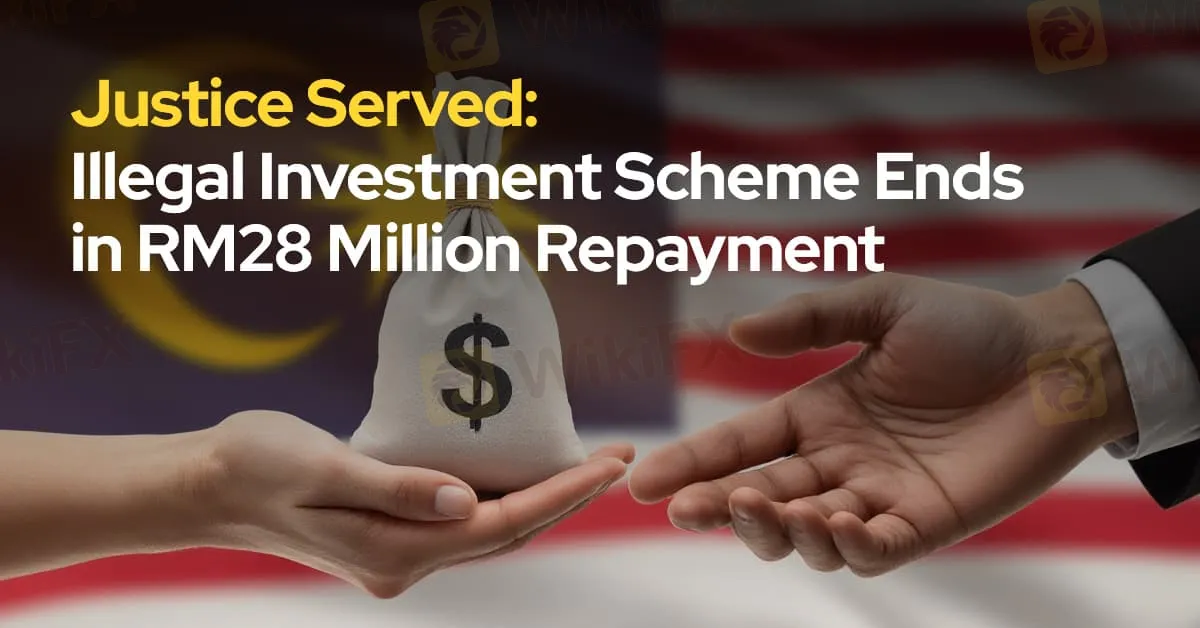简体中文
繁體中文
English
Pусский
日本語
ภาษาไทย
Tiếng Việt
Bahasa Indonesia
Español
हिन्दी
Filippiiniläinen
Français
Deutsch
Português
Türkçe
한국어
العربية
Justice Served: Illegal Investment Scheme Ends in RM28 Million Repayment
Abstract:The Kuala Lumpur High Court has ruled that a Singaporean businessman, Chan Cheh Shin, must return RM28 million to 122 Malaysian investors after the court determined that his investment operations were conducted illegally.

The Kuala Lumpur High Court has ruled that a Singaporean businessman, Chan Cheh Shin, must return RM28 million to 122 Malaysian investors after the court determined that his investment operations were conducted illegally. The decision highlights the importance of regulatory compliance and investor protection within the financial sector.
The ruling, delivered by Judicial Commissioner Datuk Mohd Arief Emran Arifin, concluded that Chan had collected investment funds without the required approval from the Securities Commission of Malaysia (SC). The court found that Chan's activities violated Malaysian financial regulations, rendering his operations unlawful.
Chan, the director and founder of Fulda Malaysia Bhd, promoted various investment products through roadshows and seminars. These promotional efforts, which began in 2016, targeted Malaysian investors who subsequently invested their money into Fulda Malaysia Bhd and another company, Palau Capital Ltd, based in Singapore, where Chan also held a directorial position.
The plaintiffs in the case alleged that Chan had persuaded them to invest in numerous financial products, including overseas ventures, with promises of substantial returns. They also stated that Chan, reportedly credentialed as a “leading banker” with expertise in finance and investments, assured them that he would carefully manage their funds and personally cover any potential losses. Despite these assurances, the investors received no returns on their investments, prompting them to file a lawsuit in 2022 to recover their money.

In an online judgement, Judicial Commissioner Arief ordered Chan to repay the RM28 million to the 122 investors. Additionally, Chan is required to pay interest at a rate of 5% per annum on the amount owed, calculated from the date the lawsuit was filed until the judgement sum is fully settled.
The plaintiffs were represented by lawyers M. Manian and R. Gajelan, while Chans legal defence was handled by Ravi Nekoo and Sarah Anthony. Following the ruling, Ravi Nekoo indicated that his client intends to appeal the decision, though further details on the appeal process were not disclosed.

Disclaimer:
The views in this article only represent the author's personal views, and do not constitute investment advice on this platform. This platform does not guarantee the accuracy, completeness and timeliness of the information in the article, and will not be liable for any loss caused by the use of or reliance on the information in the article.
Read more

Doo Financial Expands Regulatory Reach with Offshore Licenses in BVI and Cayman Islands
According to the report, Doo Group, a prominent Singapore-based online brokerage firm, has strengthened its global presence by securing new offshore licenses for its brokerage brand, Doo Financial. The company recently announced that entities under the Doo Financial umbrella have been granted licenses by two key offshore regulatory bodies: the British Virgin Islands Financial Services Commission (BVI FSC) and the Cayman Islands Monetary Authority (CIMA).

The Hidden Checklist: Five Unconventional Steps to Vet Your Broker
Forex broker scams continue to evolve, employing new tactics to appear credible and mislead unsuspecting traders. Identifying these fraudulent schemes requires vigilance and strategies beyond the usual advice. Here are five effective methods to help traders assess the legitimacy of a forex broker and avoid potential pitfalls.

Doo Financial Obtains Licenses in BVI and Cayman Islands
Doo Financial, a subsidiary of Singapore-based Doo Group, has expanded its regulatory footprint by securing new offshore licenses from the British Virgin Islands Financial Services Commission (BVI FSC) and the Cayman Islands Monetary Authority (CIMA).

CFI’s New Initiative Aims to Promote Transparency in Trading
A new programme has been launched by CFI to address the growing need for transparency and awareness in online trading. Named “Trading Transparency+: Empowering Awareness and Clarity in Trading,” the initiative seeks to combat misinformation and equip individuals with resources to evaluate whether trading aligns with their financial goals and circumstances.
WikiFX Broker
Latest News
ASIC Sues Binance Australia Derivatives for Misclassifying Retail Clients
WikiFX Review: Is FxPro Reliable?
Malaysian-Thai Fraud Syndicate Dismantled, Millions in Losses Reported
Trading frauds topped the list of scams in India- Report Reveals
AIMS Broker Review
The Hidden Checklist: Five Unconventional Steps to Vet Your Broker
Russia to Fully Ban Crypto Mining in 10 Regions Starting January 1, 2025
YAMARKETS' Jingle Bells Christmas Offer!
Why is there so much exposure against PrimeX Capital?
Doo Financial Expands Regulatory Reach with Offshore Licenses in BVI and Cayman Islands
Currency Calculator


